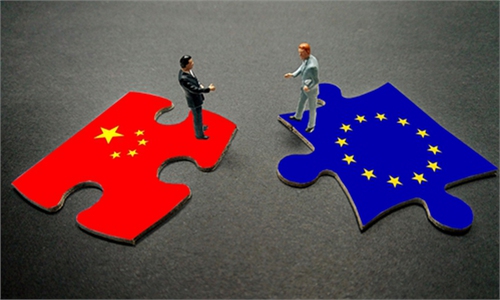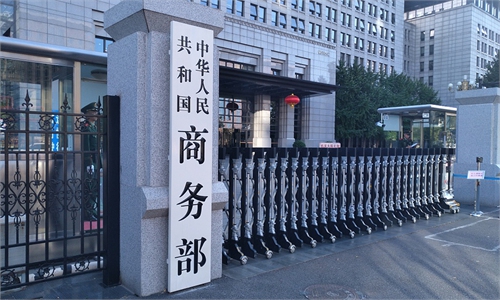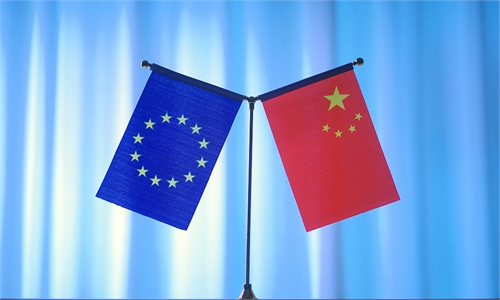COMMENTS / EXPERT ASSESSMENT
China, EU lay the foundation for stronger economies

Illustration: Tang Tengfei/GT
With COVID-19 and its mutant variants expected to dominate media headlines in 2021 and continue to shadow the global economy, the recently-concluded China-EU talks on the Comprehensive Agreement on Investment (CAI) are set to enable European and Chinese companies to be aligned closer, cooperate on clearly-defined terms, and shore up a common industrial supply chain and create more jobs for both sides' workers.
Like what the pundits have said, the bilateral investment pact, which is of major economic and political significance, is likely to be followed by the much-hoped-for free trade talks between the two giant economies, which will bear fruitful results of extraordinary proportions for the massive Eurasian continent and its people. Currently, two-way goods commerce between EU and China are valued at more than 1 billion euros ($1.2 billion) a day.
Valdis Dombrovskis, EU's trade commissioner, remarked the deal contained the "most ambitious outcomes that China has ever agreed with a third country" in terms of market access, fair competition and sustainable economic development. "We expect European businesses will have more certainty and predictability for their operations (in China)," he added.
Industries where EU countries will gain improved access include automotive, private healthcare, cloud computing, ancillary services for air transport and a spate of financial services, including openings on insurance, securities and asset management. Meanwhile, Chinese companies will gain more and securer investment opportunities in EU market.
It is the courage, wisdom and vision of the leaderships on both sides that have helped inject this predictability and certainty into their respective developments in the coming years. As Beijing always says, the two parties are strategic partners and should work for their shared common prosperity.
Shrouded in ever-thickening depressions caused by the Trump administration's nationalist "America First" foreign policy and its penchant for launching tariffs wars and coercive sanctions throughout the past four years, the EU and China have, increasingly, realized that they could choose to sideline the big bully, pivoting to building their own economies significantly larger, by opening up their huge markets to one another, so that more of their people could have a place sitting at the table of opportunity and prosperity.
It shows a win-win strategy and well-meant compromises at work for both China and the 27-nation EU. And the leaders of both sides - typically German Chancellor Angela Merkel and French President Emmanuel Macron - have played an important role for the conclusion of CAI talks within the established time frame before the end of 2020.
Obviously, the White House vehemently opposed the EU-China historical investment pact. After many years of belittling, alienating and castigating its European allies, the US government now has little leverage over them even as Washington aspired to throttle the deal. There is no one to blame for the gap in their alliance but the White House.
China's sizzling market place of 1.4 billion consumers is at play, too. The country has succeeded in largely containing the coronavirus, and the latest PMI data coming out on the last day of 2020 shows the Chinese economy finished the year with a 10th consecutive month of expansion in manufacturing and services.
Endowed with a very strong start to 2021, the Chinese economy is projected to shoot up more than 15 percent for the first quarter, and 8-9 percent real growth for the whole year. It would be hard to see any nation in the world not attracted to investing and selling in China's colossal market. As the saying goes, it's the money, stupid.
But the Trump administration, nervous about the rising capability and blossoming affluence of the Chinese people, decided to take unruly measures to decimate the rise of the country.
Trump launched a relentless trade and technology war, shut down the Chinese consulate office in Texas, cut off crucial semiconductor supplies to Chinese high-tech companies like Huawei, threatened Chinese firms listed in the New York stock market, and chased away Chinese scholars and students. In the past few years, Trump's political appointees flew all over the globe to degrade and vilify China.
The Trump administration hoped it could promote its "decoupling" strategy in an attempt to estrange and isolate China; but his efforts were rebuffed by wiser, clear-minded statesmen.
Global leaders like Merkel, who has been to China over a dozen times, know perfectly well that China's governance involves peaceful rise by constantly driving economic and technology growth, backed up by an ancient and resourceful culture that treasures perseverance, resilience, siding with the poor and powerless, and resisting bully. This culture opposes unilateralism and zero-sum games, and is fundamentally tethered to developing cordial, win-win collaboration with friends.
By 2019, the EU's total investments in China were $138 billion, while China's investments in the EU were $102 billion, which are both paltry if compared to their respective economic sizes. The Comprehensive Agreement on Investment (CAI) therefore sets up a cornerstone for China and EU countries to explore new investment avenues and make their respective economies much stronger than before.
The author is an editor with the Global Times. bizopinion@globaltimes.com.cn



